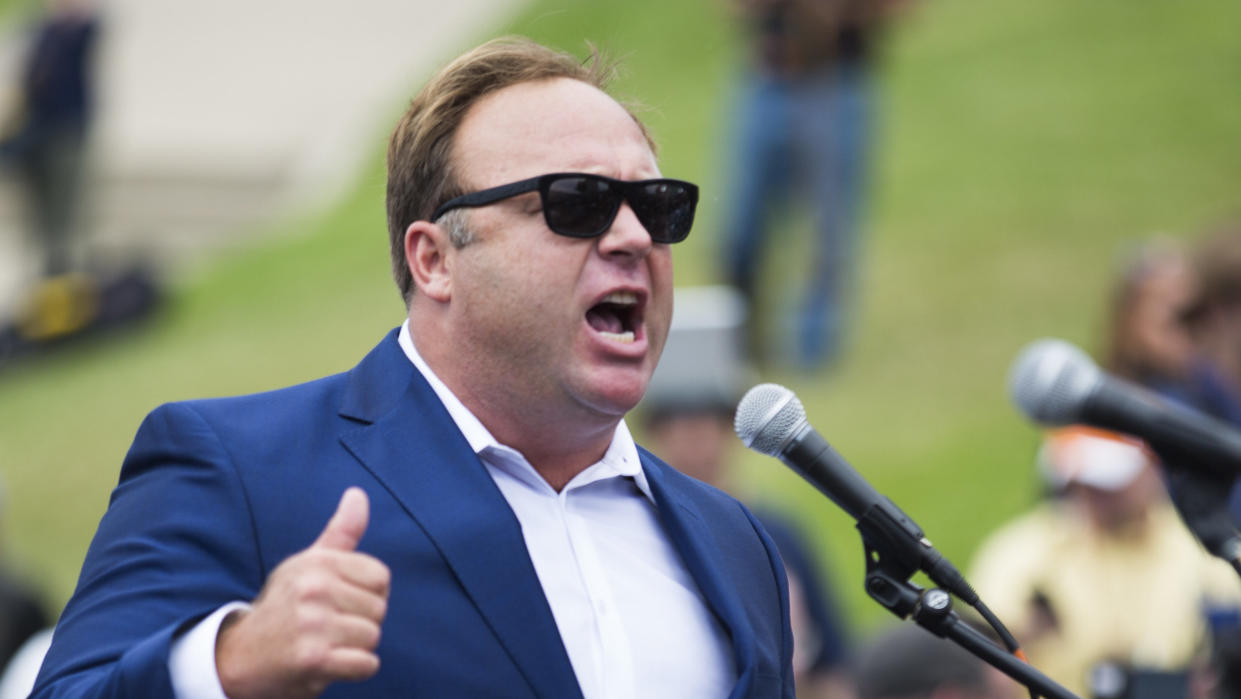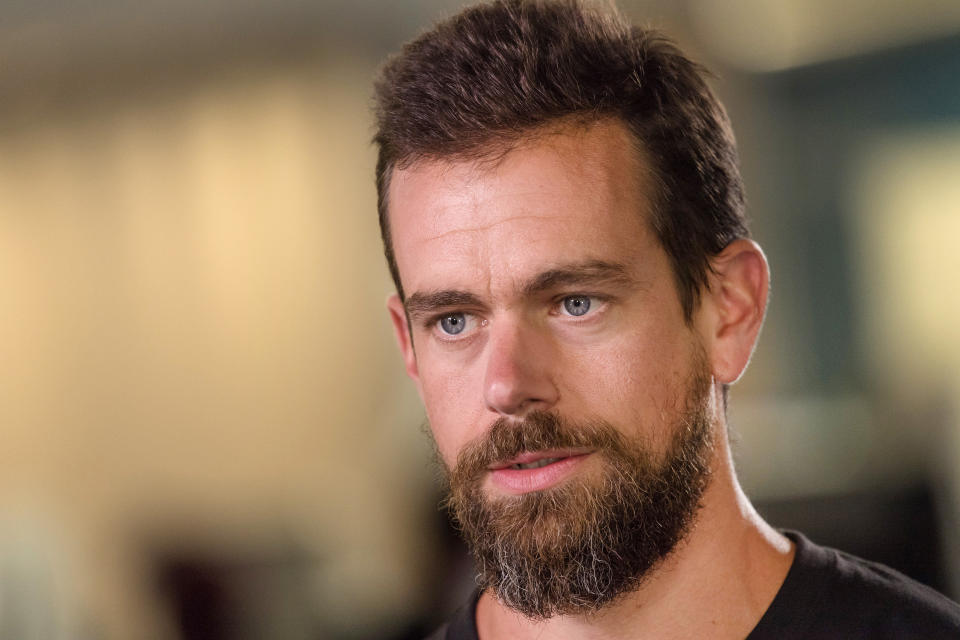Alex Jones' 'Free Speech' Shouldn't Be Your Primary Concern

After Apple, YouTube, Facebook and other companies removed or banned some of Alex Jones’ and Infowars content this week, both conservatives and many well-meaning progressives popped up to say that allowing these companies to define certain speech as hateful or unacceptable is a dangerous precedent and a potentially slippery slope. As private companies, these platforms have no legal obligation to give Jones a platform. Yet if we value freedom of speech as a broader value in our society, these claims are not without their merits. We have seen these platforms use their terms of service or community guidelines to stifle discourse and minimize the ability of people to organize and engage around pertinent issues.
However — and I can’t say this strongly enough — Jones is not the hill any free speech advocate should want to die on.
In a purely academic conversation, protecting free speech regardless of content seems to make sense. But free speech absolutism ignores the fact that, in reality, speech is not supported equally across all topics and platforms for everyone. This lens fails to consider the actual power dynamics at play and how society works in favor and support of those who uphold white supremacy and white fragility.
Often free speech concerns arise, as with Jones, in the context of those who want the freedom to express viewpoints that are not merely odious or unpopular but are also directly tied to the dehumanization and subjugation of others.
Through his lawyer, Jones has argued that he is a “performance artist” simply playing a character for money. He spends time selling random products and “supplements” in addition to spewing crazy theories and lies. He has victimized immigrants, Muslims and black Americans with conspiracy theories and misinformation, often stoking his followers to harass his targets online and in real life. Most famously, Jones is being sued for defamation by parents of a child killed at the Sandy Hook Elementary School in Newtown, Connecticut. The parents have had to move repeatedly because of him, and his lawyer is still trying to publicly reveal personal information about them, including their addresses. Up to now, the tech platforms said there was nothing they could do to stop him.
We have consistently seen the highest premium placed on protecting freedom of speech only when the speaker is white and conservative.
Meanwhile, we have seen numerous instances of progressive activists suspended or banned from these sites for far less than Jones is guilty of. Right-wing trolls have figured out that they can cynically exploit the regulation — or lack thereof — of these platforms to harass and silence minority viewpoints. Apparently, Twitter doesn’t consider hate speech to be harassment or a violation of its terms of service. How many times on Twitter have you seen people pleading with @Jack to reinstate the accounts of individuals who were merely defending themselves from targeted harassment?
When ProPublica reported that Facebook’s internal guidelines protected white males more than any other group, it reaffirmed the experiences of many on the platform, as well as those on Twitter, who had been suspended for commentary that addressed valid issues but were viewed as targeting white people or as hate speech itself. Last summer, activist and writer Ijeoma Oluo was attacked on Twitter and Facebook over her tweets and posts detailing a racist incident while on a road trip with her children. Instead of addressing those attacking Oluo, Twitter and Facebook took action against her instead. Independent media actors, activists and even casual users who reflect on structural inequities and engage in dismantling systemic oppressions have often been met with labeling, censorship and constraints on our expression. And because these companies fear endless accusations of anti-conservative bias, we have consistently seen the highest premium placed on protecting freedom of speech only when the speaker is white and conservative. In those cases, the harassment and civil rights abuses that are rampant across these platforms and are the natural result of these decisions are of secondary concern.
Commentators spill endless ink on protests against white conservatives on college campuses but raise no concerns about the harassment of journalists or death threats to progressive academics. This notion that we have to hear and defend all ideas to ensure the rights of others without any concern for the harms being done to marginalized communities is stupid.

Addressing this issue in the context of clashes between the “alt-right” and anti-fascist protesters in Berkeley, California, last year, Meleiza Figueroa wrote in The Nation, “This battle is emphatically not about free speech. This is about the ability to shape consensus in a time of rising mass anxiety and political extremism. The ‘power of framing,’ as linguist George Lakoff puts it, is everything.”
Writer and activist Devyn Springer further explained it in Medium last year:
Color-blind, non-contextual or language-specific approaches to social media censoring by corporations like Twitter allows for the same consequential racial disparity. By perpetuating absolutist notions of free speech, it inherently positions hate speech by white supremacists as equal to or extremely similar to the speech and actions of marginalized communities. Whereas one might be inclined to see online censorship as separate from the laws and policies of real-life interactions, we must begin to see the ways they feed off of one another and create a persistent silencing of marginalized voices.
Springer argued that we need to shift beyond this purely academic discourse of absolute free speech and look at the real material conditions that end up reinforcing the status quo ― a status quo that disproportionately regulates and limits the actions of marginalized communities.
Considering how crucial social media platforms have become as alternative sources of building power and information, we cannot ignore how these entities determine who is permitted access. It is unsurprising that Twitter has decided to let Jones have a refuge on its platform. The site is perhaps the worst example of enabling the targeted harassment of vulnerable people while banning others for far lesser infractions. When pressured to actually do something about the hatred on the site, Jack Dorsey and his company have so far come up empty.
It is unsurprising that Twitter has decided to let Jones have a refuge on its platform.
Yet the message has been clear: They prioritize the right of people like Jones to broadcast misinformation and invective to their audiences over the right of marginalized people to be able to participate in the public discourse without threat or harassment. There is no value in this brand of free speech advocacy that will fight tooth and nail on principal for the unprincipled but stay silent about issues of platform and access that effectively deny equitable free speech to marginalized communities.
The protests over Jones’ banning aren’t about freedom of speech and making sure everyone has a say. This is about maintaining and sustaining white supremacy and power. This is about Jones and his ability to earn ridiculous amounts of money peddling falsehoods, inflaming hatred and selling junk. There is no absolute right to be a hateful grifter without accountability.
Jones and his ilk have built a media empire solely focused on maximizing wealth and opportunity without regard for the impact on society and marginalized communities. Those defending him disregard the attacks that have taken place against independent progressive voices and platforms.
Defending Alex Jones’ right to exist on commercial platforms is about protecting white fragility and a mediocre extreme. It has nothing to do with supporting the masses and our freedoms that may be compromised.
Anoa Changa is an activist and attorney in Atlanta. She hosts the podcast “The Way With Anoa” and is a co-managing editor of The Progressive Army Blog.
This article originally appeared on HuffPost.


